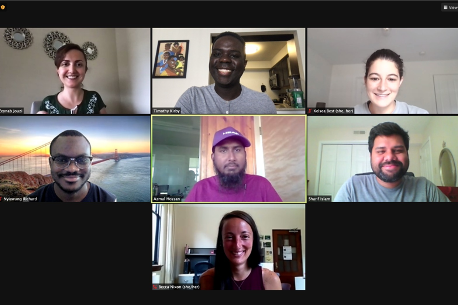Below, members of the graduate student-led team synthesis project, Climate Gentrification share what they've learned during their first year of working together on an interdisciplinary, synthesis project. Read on to hear what team members Kelsea Best (Vanderbilt University); Md Sariful Islam (Virginia Tech University); Zeynab Jouzi (North Carolina State University); Azmal Hossan (Colorado State University); Timothy Kirby (Florida International University); Rebecca Nixon (Purdue University); and Richard Nyiawung (University of Guelph) have to say.
In 2020, our SESYNC graduate student-led project formed to investigate ways in which climate change contributes to gentrification and displacement across the U.S. East Coast. Since our Pursuit’s initial ideation and design through its implementation, we (three women and four men from four different countries, representing seven different institutions and fields of study) have grown as a team and as individuals. Now, more than a year after our Graduate Pursuit began, our team wanted to take the time to reflect on the personal and professional growth that this experience has provided us so far.
In some ways, the process of writing this blog mirrored the ways in which we’ve learned to work together on this project. It began with presenting an idea; followed by inviting feedback; and gathering input from each team member. We then took time to process information individually; talk about our main ideas; divide up the work; and once again give feedback on our progress. While these may seem like simple steps, repeating this iterative process to move our project forward and collaborating with a diverse team have provided significant opportunities for professional development, expansion of practical skills, and personal growth.
Professional Development
With this project, we have been able to incorporate one of SESYNC’s primary objectives—integrating research with education—into our knowledge co-production process. By integrating education into our research process, we have gained communication skills that allowed us to not only educate each other about the parameters of the emerging field of climate gentrification but also a lay audience. From writing the proposal to conducting our research, we’ve had to communicate our science in a way that people can understand across disciplines, nationalities, cultures, and backgrounds—this has been important for us as our group is diverse in all of these ways. This experience has pushed us to be very deliberate about the language we use to share our work—a skill that many researchers are realizing is key to bolstering confidence in scientific research. In addition, we realize that being able to communicate effectively will help us write future proposals and respond to feedback from future grant agencies, as well as our prospective team members.
Moreover, the COVID-19 pandemic presented additional opportunities for honing our communications and interdisciplinary research skills. Collaborating during a worldwide pandemic forced us to find novel ways of organizing, communicating, and developing a sense of camaraderie, including having frequent check-ins, intentionally developing a safe space for all team members, and building capacity for flexibility early in the team formulation process. While we are still in the middle of this Pursuit in the (hopefully) waning days of this pandemic, the communication skills and flexibility we’ve developed and the actions we’ve taken have contributed to our success thus far.
Most importantly, this project has provided opportunities to expand our research portfolio and capabilities. For many, it is obvious that research problems in the 21st century, especially coupled socio-environmental problems, have become so complex that seeking solutions often requires interdisciplinary theoretical and methodological expertise. This Pursuit has enabled us to work on a research topic that is different from our primary research, thus strengthening our ability to pursue different/diversified research projects. We are also building an interdisciplinary professional network through this project, which we believe is going to be a significant resource for our own professional development in the future. Having a career in academia is the top priority of all the members of our group, and we believe that the experiences we’ve gained in doing impactful, interdisciplinary research will be crucial to our succeeding in academia.
Personal Growth
Additionally, being a part of this group of young professionals provided us with the opportunity to grow personally. Because we deliberately developed a safe space for all to grow early in the process, we are able to share our opinions with other members of the team and discuss any issues together, helping each other with respect and compassion to advance our academic careers. We are achieving our team’s collaborative spirit through our commitment to inclusivity, which is helping all of us become more progressive and to create strong bonds between team members that can last throughout our careers.
Because we felt welcomed and accepted in this group of peers, we used the group as a supportive environment for building confidence and enhancing personal skills such as productive conflict resolution, problem solving, and leadership. Knowing that we would not be judged for any shortcomings or mistakes was a unique experience for many of us. For example, though three graduate students were the team leads, we deliberately created space to provide leadership opportunities for all. Team leads encouraged others to take leadership roles in one or more sessions that were relevant to their field of expertise. After more than a year of bi-weekly meetings, we ended up having a lot of meetings on a variety of topics—creating the time and space to not only advance our project but also to develop our soft and transferable skills.
Overall, our SESYNC project has allowed us to work with emerging scholars from different geographical locales and lived experiences. Our team has come together to research climate gentrification, but, most importantly, grow personally and professionally as early-career researchers. We are grateful for this experience provided by SESYNC, and we are eager to continue our Graduate Pursuit!
